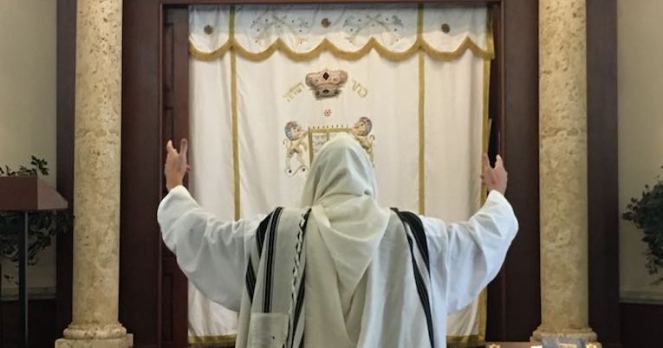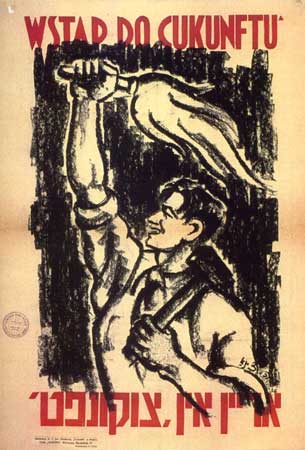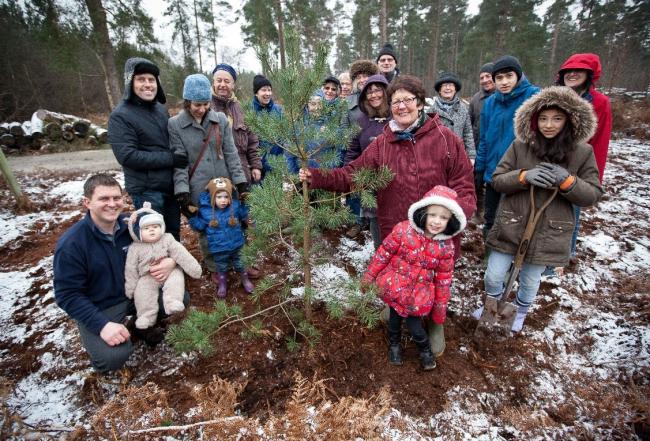The Reform liturgy for Yom Kippur takes on a tour through the progression of Judaism. The reading choices are different to in Orthodoxy. Whereas in Orthodox synagogues, you would hear the story of the High Priest’s atonement rituals with the two goats in the morning and the rules of illicit sexual relations in the afternoon, the editors of the Reform machzor felt these texts did not reflect their values and substituted them. In the morning, in our community, we read Nitzavim, Moses’s final address to the people. For the haftarah, we read Isaiah’s denunciations of exploitation. Then, in the mussaf service, we read the stories of the martyrdoms of our sages with the destruction of the Temple in 70CE. Through this history, we see the values of progressive Judaism elucidated at each stage: freedom, personal responsibility, decentralisation and anti-authoritianism. For my Yom Kippur sermon this year, I retold those stories to show how those values emerged.
“You are all standing here today,” said Moses.
He looked out over the vast plains of Moab. He gazed at his assembled audience, stretching far back into steamed blurry visions in the distant desert. He saw their weariness and felt his own. At 120, his physical strength had not weakened. His eyes still saw clearly and his teeth worked perfectly. Although he carried a stick, he did not depend on it. Physically, he was fine. But, mentally, he was drained.
For forty years, Moses had presided over the people. Gradually, he had tried to cede power. He had appointed judges and officials who would help resolve disputes. He had tried to teach people as far as possible all the laws that he had received from God on that great mountain in the Egyptian desert. More than ever, he felt ready to go. But the question was: were the people ready to be without him? What could he tell them in this last speech to prepare them for a society where they would have to lead themselves?
“You are all standing here today,” Moses repeated. “All of you.”
“But, really, all of you. Women and men. Children and the elderly. All of you are here. All of you were present at Sinai. I need you to know that it wasn’t just me and Aaron who did all this. You emancipated yourselves. Nobody forced you to leave Egypt. You got up and went because you knew you deserved better. You could have turned back to Egypt any time, but you didn’t, because you had faith. Hold on to that feeling now.”
Perhaps, Moses thought, he had not been specific enough. “Yes, the strangers too. All the foreigners who have joined us on the way. And the wood-choppers and the water-drawers. The people who do the most menial work among you. The most neglected among you. I want to mention you especially. I want you to know that you were at Sinai. Nobody can take that away from you. You experienced the full might of God and you choose to be God’s people. Never let any priests or princes tell you this was all their work. It was yours.”
“This,” said Moses. “This covenant that God made stands for all time. It speaks to all future generations to come. The soul of every Jew is here with me. All of you are witnesses. All of you have had the responsibilities of this religion entrusted to you. Even if you are scattered to the ends of the Earth, God will find you there. This religion stands firm in every time and place.”
The Israelites stared back at Moses in a calm silence. Only the sounds of gentle winds and crickets interrupted Moses’s speech. These followers had long known that this speech was coming. They had had plenty of time to prepare for it, and yet felt completely at a loss.
“What I’m saying,” said Moses, “is that the Torah is yours. God didn’t give it to me or to the scholars. God gave it to you, to read it and learn it and interpret it in the way that works for you. These commandments that I put before you today are not too incredible for you, nor are they too far from you. They are not in the heavens, that you should say, ‘Who among us can go up to the Heavens and get it for us and impart it to us, that we may observe it?’ No. It is right with you. It has been with you all along. You are in charge of your lives. You are responsible for your destinies.”
That was the message Moses left with the Israelites and through them with us, the Jewish people. It has a stronger bearing on us now than we may realise. It demands of us way more than we might be prepared to accept. When Moses died, he did not place power in the hands of priests and kings. He handed it over to everybody. There would not be anyone to frighten the masses into following orders or to offer up commands. The rules were all already there. The people had been entrusted to follow them for themselves.
With time, certain leaders did try to control Judaism. With the rise of the Temple, a centralised cult in Jerusalem set out the rules. The priests insisted that penance could only be paid with animal sacrifices and ritual fires. They tithed the people and brought them under authoritarian rule. Outside the centre of the city, the prophets chastised the priests. Among the urban poor and the rural peasants, the prophets cried out that God had given the Torah of justice to everybody, that God abhorred inequality and would never give religious power to the elites.
That is why, today, we read also the haftarah of Isaiah. Isaiah looked upon the centralised cult and was revolted by it. He saw a nation rife with exploitation and hypocrisy. He chastised the wealthy: “On the days when you fast, you exploit the workers! You fast and you strike with a wicked fist.” Such fasts, said Isaiah, meant nothing to the Almighty. God would not listen to the pleas of the wicked. Instead, insisted the prophet, God sought for every oppressed person to be free, for every chain to be broken, for every mouth to be fed and every soul to be remembered. This religion, said Isaiah, was never given to the exploiting class. It is the blessing of the oppressed. It is the hope of freed slaves and menial workers. It is a promise of redemption for people who could never quite believe their lives had meaning. We are the heirs to their Judaism: to the Judaism of the prophets.
When the Temple was destroyed, a group of visionary rabbis realised that the time had finally come to take back control from the priests and hand it over to the people. Chief among them was Rabbi Akiva Rabbi Akiva had been a peasant farmer. He did not even learn to read until he was 40. He came from the poorest class and knew their struggles. He saw the Priesthood trying to control our religion in their own interests and vowed to resist them.
Akiva insisted that the Torah was not a dead letter, but the word of a living God. Everyone could read it and find something in it. Every letter could be analysed. Whole worlds lay hidden in subtle sentences in our holy text. Akiva and his disciples replaced Temple sacrifices with prayers, good deeds and study. These were acts of piety available to everyone, no matter what their wealth our status. He created a Judaism of the people, by the people, for the people.
Our parashah today says “the Torah is your life and the length of your days.” Akiva agreed. He said that Torah was to the Jews what water was to the fish.[1] Akiva truly understood what it meant for everyone to receive the Torah. All of us were there for it. Everyone in this room. So all of us know something unique about the words of the living God. All of us have something important to contribute.
Akiva handed us over freedom. He took Judaism out of the hands of invested leaders and put it into the lives of the Jewish people. Read it, he said. You will find your life’s meaning in it. You will see that these are the words of a loving God. You will realise that you were created in a Divine image and that everyone else was too. You will understand the need to pursue justice.
Moses, Isaiah, Akiva. The progenitors of our Judaism. All of them with a simple message: this is your Judaism. You are free to follow it as you wish. With that freedom, they gave us the greatest gift they could. They gave us responsibility. Pharaohs would not govern our lives. Nor would bearded men in big gowns. We would govern our lives. We would have to choose for ourselves between right and wrong. We would have to live according to the justice demanded on High, with nobody to judge us but the still, small voice of conscience God had planted within us.
Take this day of Yom Kippur and realise that your life is in your own hands. Whether the world is just or unjust is up to you. Whether you are kind or unkind is up to you. Whether the oppressed remain oppressed or go free – that is up to you.
Let us resolve this day to take the true meanings of our religion to heart and to pursue justice in every quarter.
Gmar chatimah tovah.

I gave this sermon on Yom Kippur morning at Kehillat Kernow, the Reform Jewish community in Cornwall. If ever you are in the area, I highly recommend going to this warm, welcoming spiritual community.
[1] Berakhot 61b


